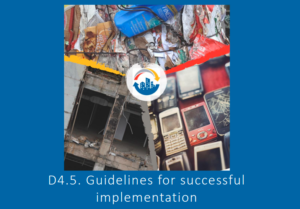 07/01/2021
07/01/2021New guidelines on effective practices and instruments for a high-quality recycling take into account the COVID-19 impact on municipal waste collection systems.
To make its results widely available, the H2020 COLLECTORS project, in which the WEEE Forum has been involved, recently published practical guidelines for local waste collection systems to better assess their situation and improve their performances. These guidelines have now been updated to include a new part on the impact and measures taken to face the COVID-19 pandemic. A similar update was brought to policy recommendations also issued by the project.
For three years, partners of the COLLECTORS project have been analysing and comparing existing good practices of waste collection and sorting for paper and packaging, waste electrical and electronic equipment, and construction and demolition waste. The results and outcomes of this work has been made available to decision-makers from local and regional authorities, producer responsibility organisations, and national and EU institutions in the form of practical guidelines. These highlight effective practices and instruments leading to high quality recycling, how to overcome local specific challenges, and what environmental and economic benefits can be obtained by improving the waste collection systems. The project’s consortium just published a new version of the document to include a section on the COVID-19 pandemic and its impact on waste collection. It is based on a survey and complementary researches conducted by COLLECTORS project partner ACR+ to identify good practices that can contribute to keep a proper waste collection service and not disrupt separate collection.
The impact of the COVID crisis on municipal waste management
The COVID-19 pandemic forced public authorities and municipal waste operators to rapidly adapt their waste management systems and procedures to take into consideration elements such as safety and health measures for employees, waste treatment requirements, general procedures due to coronavirus for waste sector, staff availability, etc. The COVID-19 pandemic has several impacts on municipal waste management, among which:
- Impact on waste generators: change in population, slowdowns or closure of business, stop of tourism activities… that led to fluctuating quantities and composition;
- Impact on the composition of waste generated, generated by the changes of consumption patterns and the generation of waste from personal protection equipment, generally disposed as healthcare waste or residual waste;
- Impact on waste services: shortage of staff, restriction of movement preventing inhabitants to reach collection points.
These different trends drove local authorities to rearrange their collection services, e.g., by closing civic amenity sites to limit interactions between the population and staff, or reduce or stop some of their services to overcome the difficulties linked with shortage of staff. It had an impact on source separation, but also on fly-tipping that increased in many territories.
How to secure separate collection during pandemics?
Although it is challenging to come up with recommendations, due to various factors, the project made recommendations for handling waste collection in time of pandemics:
- Flexibility is key to ensure the continuation of priority collection services, with re-allocation of resources with different collection schemes;
- Keep civic amenity sites open with adequate measure such as a system of online appointments;
- Define priority levels for collection services, focusing on collection modes limiting the interactions with inhabitants, or on specific waste fractions (e.g., residual waste, food waste, etc.);
- Give priority to online communication to reach inhabitants, provide clear information and simple, coordinated messages, and explaining the reasons behind changes;
- Establish a consistent and continuous reporting of the evolution of quantities.
- Tackle illegal practices such as fly-tipping by setting a closer monitoring, the enforcement of the regulation, an adequate communication, and ensuring that alternatives collection systems are still available (such as civic amenity sites);
- Take advantage of guidance, support systems and networks, to identify good practices and recommendations;
- Follow UNEP recommendations regarding the management of waste from COVID-positive households.
How to promote these recommendations is addressed in the last update of the COLLECTORS policy recommendations which primarily focused on six key topics: harmonisation of separation guidelines, improvement of local WEEE collection, EPR fee modulation, local knowledge and data availability, recycling of construction and demolition waste, and the economic sustainability of high sorting performances.
About
The WEEE Forum a.i.s.b.l. is an international association representing 51 producer responsibility organisations across the globe. Together with our members, we are at the forefront of turning the extended producer responsibility principle into an effective electronic waste management policy approach through our combined knowledge of the technical, business and operational aspects of collection, logistics, de-pollution, processing, preparing for reuse and reporting of e-waste. Our mission is to be the world’s foremost e-waste competence centre excelling in the implementation of the circularity principle.
Transparency Register ID 702397445-73.
Copyright 2019 All Rights Reserved
Contact
BluePoint conference and
business centre
Boulevard Auguste Reyerslaan 80
B-1030 Brussels
Belgium
Newsletter
Subscribe to our mailing list to get the updates to your email inbox.